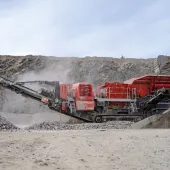Hope makes bigger local economic contribution

Updated report shows cement works’ local economic contribution increased by 15% to £61 million in 2018
AN independent report on the economic impact of the UK’s largest cement works has shown that it contributes £61 million to its local economy.
The updated economic impact assessment report was commissioned from global management, engineering and development consultancy Mott Macdonald by Breedon Group for their cement works at Hope, in the heart of the Peak District National Park (PDNP).
Its aim was to establish how much Hope Works contributes both financially and in terms of employment to the Park’s economy.
This latest report (for 2018) shows that Works supported 270 jobs (202 directly, 52 indirectly and 14 as induced jobs), including two jobs from community and social impacts, contributing £61 million to the local economy and accounting for 7% of the Park’s total economic output and 1.8% of its total employment.
This represents an increase of 15% over 2017, when Hope Works contributed £53 million, and more than 35% over 2013, the year for which Mott Macdonald produced their first report, when the Works contributed around £45 million, with roughly the same number of direct employees.
In a region with a long-established minerals and aggregates industry, Breedon’s Hope Works accounts for around 16% of UK cement production, which is currently running at more than 9 million tonnes per annum.
However, the economic benefits of the site extend well beyond its direct footprint. Nearly half its direct employees live within the PDNP itself, supporting the area by spending their wages locally (some £500,000 of induced GVA compared with £59 million of direct GVA and £1.7 million of indirect GVA).
In addition, around £4.7 million of supplier expenditure by the site is with firms based in the PDNP, notably local industry contractors and manufacturing companies supplying specialist products and services in the areas of welding, scaffolding, engineering, joinery, mechanics, haulage, fabrication, photography and catering.
These indirect purchases of goods and services along the supply chain, coupled with the spending on direct and indirect employee wages, create a ripple effect and support further rounds of economic activity. In 2018, Hope Cement Works supported well over 60 additional jobs from these indirect and induced impacts, contributing another £2.1 million to the local economy.
This means that for every 10 jobs created in the PDNP, nearly three additional jobs are created from the multiplier impact of the Breedon site.
Hope’s cement works has manufactured cement for more than 90 years and has a long tradition of actively engaging with the local community through its many social and communal activities.
These include access for local residents to the Hope Works estate and the Earles Sports and Social Club, as well as on-site open days and tours and a range of local business and community partnerships.
Taking into account the monetizing of rental savings, volunteer time and charitable donations and sponsorships, the Hope site invested the equivalent of well over £160,000 in the community in 2018, supporting two additional jobs within the PDNP and contributing a further £60,000 to the local economy.
Ed Cavanagh, works manager at the Hope site, said: ‘It is gratifying to see the healthy increase in our contribution to the local economy over the past few years. We’re very proud of the part we play in the lives and employment of people in the Peak District National Park.’
Hope has the capacity to produce around 1.5 million tonnes of Breedon Portland, Breedon Portland Plus and Breedon Rapid cement every year, which equates to more than 90 six-storey office buildings or 28 community hospitals, 125,000 houses or 100 schools.
More than half the cement made at Hope is transported in bulk by rail to depots in the South East (Dagenham and Reading), West Midlands (Walsall) and North of England (Dewsbury), ensuring the product is delivered as sustainably as possible.
A copy of the report, ‘Hope Cement Works: A £61 Million Contributor to the Peal Park Economy’, can be downloaded below.









